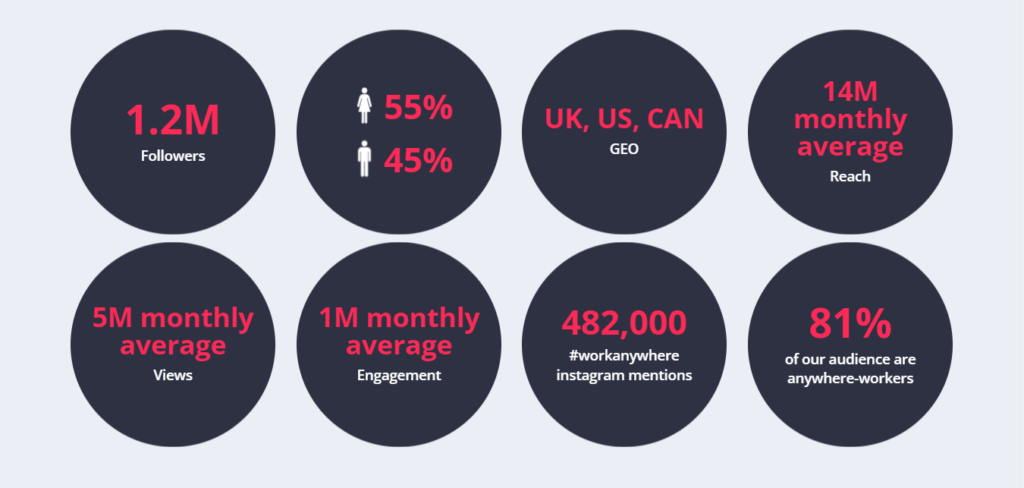Beyond swaying opinions, theplanner.guru understands how a group of collaborators are banding together to create a shift in policy towards building a remote working community.
The Covid-19 pandemic brought with it some critical shifts not just in how we live, work and play but also in how we think and approach our various challenges. One such development has been #WorkAnywhere – “a global advocacy movement representing remote and hybrid workers”.
A 2021 Gartner study revealed that in 2022, nearly a third (32%) of all employees are working remotely. A growing concern is that a major portion of these workers feels isolated or lonely, which is a major health concern that is believed to be worse for a person than smoking 15 cigarettes a day.
“Loneliness can lead to sedentary behaviour, relationship damage, depression, substance abuse and more… In response to this dangerous and mostly-hidden epidemic, the #WorkAnywhere campaign is urgently convening policymakers, businesses and academics to explore solutions,” noted #WorkAnywhere in its communication to theplanner.guru.
To address this issue, the founders of #WorkAnywhere hosted an EU Parliament Roundtable Event on 23 February 2022 titled ‘The Need for Community in a Remote Work Economy’. The Roundtable welcomed MEP Lidia Pereira, a Member of the European Parliament, as its moderator, with #WorkAnywhere CEO Ben Marks, and Dr Constance Hadley, a lecturer and organisational psychologist at Boston University, weighing in on the discussion.
Research component
An exciting development during the two-hour event was the announcement that #WorkAnywhere is conducting a landmark study on ‘Remote Work and Social Connection’, in partnership with Selina.
The research project is being led by Dr Hadley together with Dr Sarah Wright of the University of Canterbury and will be the largest study ever conducted on remote working and connectedness. It aims to establish if “working alongside friends, family and meaningful acquaintances during the workday can be just as (if not, more so) socially fulfilling as working from an office alongside colleagues.”
The results of the study will be released in April 2022 and it is hoped that the research will inform policies towards remote working within both the public and private sectors.
“We don’t want the lonely, lockdown-imposed home-working of the pandemic to become synonymous with remote work. We believe remote and hybrid working holds the promise for so much more. This research will give policymakers and businesses the tools to have a balanced, data-driven conversation about community and human connection in a remote working world,” says Ben.
“Now, we’re at a crossroads. Because so few of us were given the training, guidance and tools to implement remote work properly, we feel isolated and burnt-out. Because many managers still treat their employees like small children who can’t be trusted, we’ve seen a terrifying rise in digital leash technologies that track workers’ every move.”
– #WorkAnywhere
Geared towards solutions
In her presentation, Dr Hadley highlighted that while remote work can lead to increased levels of loneliness, individual and contextual factors play a role here too.
“Organisations are struggling with how to create a sense of belonging to combat employee loneliness and disconnection. This research examines what steps organisations, policymakers, and workers can take post-pandemic to bolster social connectivity and well-being at work, no matter where it is conducted. Importantly, the results will pertain to not just organisational employees but also to the large numbers of contractors and freelancers who contribute to our global economy,” says Dr Hadley.
The study, explains Dr Wright, is at the forefront of capturing the experiences of remote workers: “No longer are remote workers ‘forgotten’ but a central part of our contemporary workforce. The #WorkAnywhere survey will ensure that their collective voice is heard by organisational decision-makers and policymakers,” she adds.
Motivating factors
The Covid-19 pandemic has resulted in a phenomenon dubbed the Great Reshuffling, which, according to the World Economic Forum, came about following the lifting of initial lockdowns: “When life became more ‘normal’, a large number of people chose to leave their jobs. This has caused record numbers of open positions and staff shortages in some industries. Nearly 3% of the US workforce quit their jobs in October 2021, with some of the highest resignation rates in hospitality and healthcare,” notes the organisation.
One of the answers that the #WorkAnywhere study will seek to answer is how loneliness is driving the Great Reshuffling. In addition, it will ask the following:
• What is the long-term effect of the pandemic on loneliness patterns and persistence?
• How can employers ethically and effectively monitor loneliness in their organisations?
• What workplace interventions work best for reducing employee loneliness?
• What public policy/regulatory interventions are needed to support workers, esp. freelancers?
• Can people differentiate loneliness “at work” from loneliness “in general” when they never go to an office?
• Can remote workers reduce loneliness by focusing on non-coworker relationships?
• How do relational needs factor into decisions about how much and where to work remotely?
The survey is currently ongoing and hopes to reach 5 000 respondents by April 2022. If you would like to participate, you can do so here.
#WorkAnywhere’s drive, in brief
#WorkAnywhere believes it is time to codify a ‘Remote Work Charter of Rights’.
To get the ball rolling, #WorkAnywhere has drafted several points that will be refined over time through collaborative efforts with several researchers, policy experts and remote workers. The aim of this is to foster more enabling remote working policies and create more conducive environments that grow remote working communities.
#WorkAnywhere has reached millions of people, and growing:





